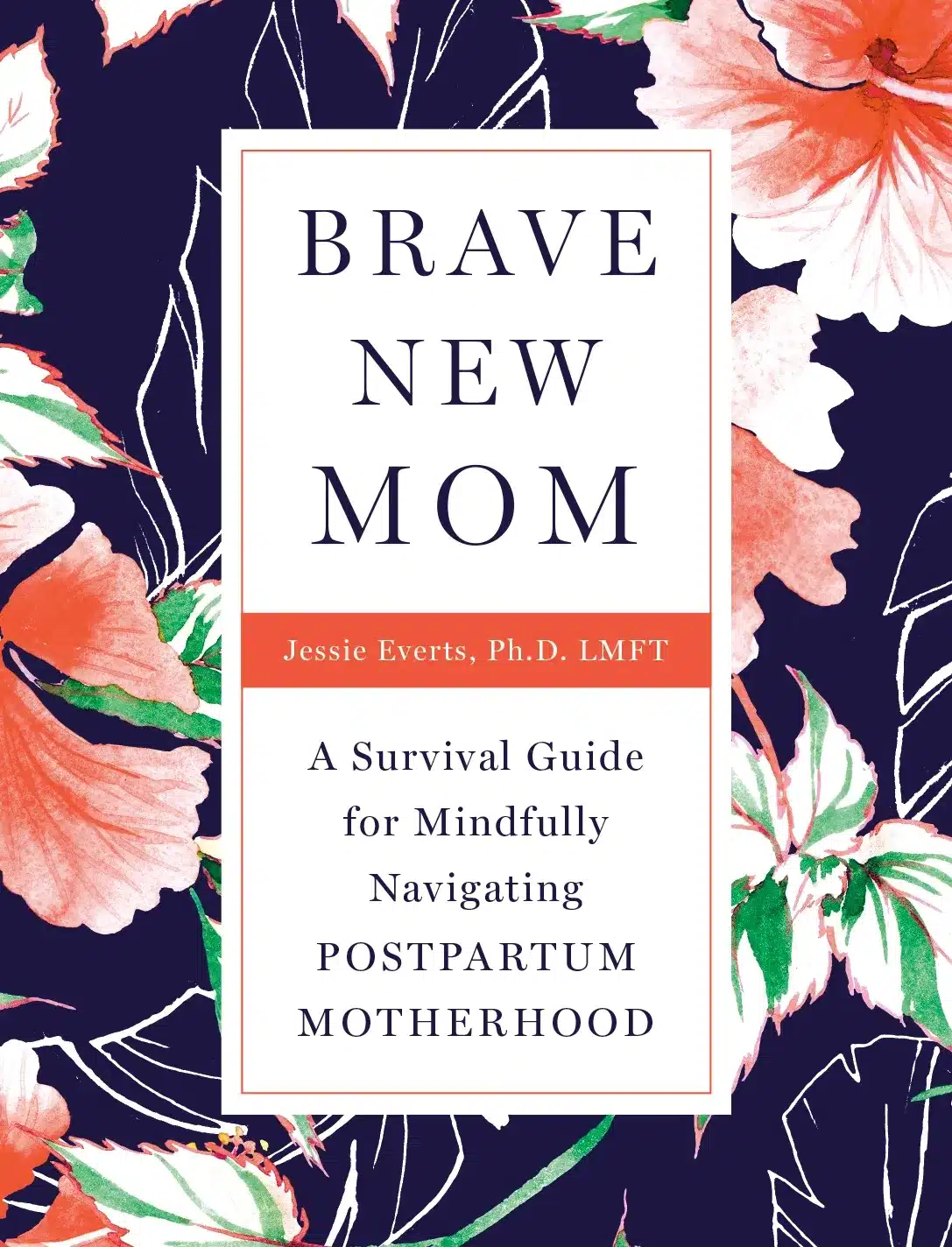Today’s post is written by Dr. Jessie Everts, Ph.D., LMFT. Dr. Everts and I connected in one of our therapist networking groups dedicated to reproductive and perinatal mental health. What’s so cool about this specialty is that is quite broad—both Dr. Everts and I work in this space, and have different areas of focus, showing how wide the needs are for this all too often underserved population.
Dr. Everts is a Licensed Marriage and Family Therapist, writer, yoga teacher, and mom in St. Paul, Minnesota. Her specialties include working with women and LGBTQ+ individuals who experience anxiety, trauma, life transitions, parenting, and are in the postpartum period. She has a passion for mindfulness, and incorporates this into her personal life and clinical work. She recently wrote a book (available for pre-order here!) called Brave New Mom: A Survival Guide for Mindfully Navigating Postpartum.
This post if for all the mamas—the expecting moms, first-time moms, seasoned moms, and anyone who knows and loves a mama in the or entering the postpartum period; a period that is exciting, exhausting, anxiety provoking, and all-consuming. Moms receive little-to-no education or tips for how to prepare for postpartum. In addition to the physical and emotional changes moms experience, they are also caring for an infant—all while healing themselves. These tips are easy to learn and apply, and require minimal time commitment, which is perfect for new moms (because who has time, right?). If you have or a little one at home and you’re feeling the weight of this adjustment—you’re not alone. Dr. Everts is here to share some helpful tips!
It’s no surprise that parents are struggling these days. As we enter the year of “seconds”—the second holiday, birthday, springtime since the start of the pandemic, parents who may have started to feel as though they’ve gotten into a pandemic rhythm, are now faced with worries about how and when to broaden their circles, re-engage with previous activities, get back to “normal.”
One group of parents who are particularly at risk during this time are new moms—those pregnant and those who have recently given birth within the last year. The COVID-19 pandemic has amplified the isolation and mental health concerns of new moms, as we have reached a point where 40% of new moms report feeling lonely, and 60% report anxiety that is unmanageable during the pandemic.1
Moms may have given birth during a time when they had to be mostly alone in medical settings, unable to have family members visit the new baby, and unable to get out of the house in ways that can be so necessary as self-care in recovery.
Here’s the good news: There are things we can do to help support and reduce the heaviness associated with symptoms of postpartum depression and anxiety for new moms—both as supports, and as new moms ourselves.
Mindfulness is a wonderful and accessible tool for all of us, new moms included—it’s the practice of bringing your nonjudgmental awareness to the present moment, including what is going on inside of you; your sensations, thoughts, and feelings.
For so many new moms, mindfulness is something that is missing. When you’re a new mom, you’re often in “survival mode”—just trying to get through the days or hours, focusing so much on the baby’s needs that you might not give a thought to yourself at all. You might be living with intrusive thoughts or worries swirling around in your head, with less distractions than you’re used to. Practicing mindfulness can provide a moment of calm, of checking in with yourself, and of honoring your feelings, needs, and the significant journey you are on as a new parent—one that you were likely not well-informed or prepared for.
The cool thing about mindfulness is that it doesn’t require a huge time commitment, or even expertise. Mindfulness is easy to learn, and can be applied in as little time as a few short minutes.
Here are some practical ways new moms can introduce moments of mindfulness into their lives:
- A deep, cleansing breath: This is a magical tool that we could all stand to do at least once a day. When stress or worry is creeping up on you, make a conscious choice to stop what you’re doing and focus in on your breathing. Take a deep, spacious inhale, hold for just a second, and then release fully—imagine that your exhale is releasing the tension or stress you’re feeling. Pause for a second or two after you exhale. This pause is a powerful reset for your nervous system. It engages your resting, calming vagus nerve and drops your body’s felt sense of stress significantly. Do this deep, cleansing breath with that important pause after you exhale as many times as you need to feel a “reset” in your stress level.
- Self-care using the senses: Self-care is a critical piece of postpartum mental health, and one that too many new moms deprioritize when there’s a new baby to care for. Even if there is a moment of quiet while baby is sleeping, you might not know what to do as a little act of self-care in the midst of other tasks you “should” do. Think through your 5 senses—sight, hearing, taste, smell, and touch. Is there a way to engage one of them and give yourself a positive sensory experience, even if for a moment? You might step outside and feel the breeze on your cheeks. You might take a few minutes to really savor your cup of tea or a snack. You might light a candle or give yourself a few minutes to read, journal, or listen to music. Each of these are acts of self-care if you do them with intention of caring and nourishing yourself in small ways.
- Feeling supported and connected: Though your support system might not be as close or available as you’d like, the most important benefit of support in the postpartum phase is feeling cared for and connected to others. This is a practice, of recognizing what kind of connection to others you might be needing and allowing yourself to reach out in the ways you can. This might mean reflecting on your partner in a loving, appreciative way and really taking in the feeling of being supported by them. It might mean calling a friend when you have the energy to, without pressure of having something to say—just letting them know you were thinking of them and wanted to connect. Or it might mean imagining the millions of mothers out there around the world, many of whom might be in the same phase or feeling some of the same struggles as you. Reflecting on the shared humanity of our emotions or experiences allows us to feel supported by a bigger net of mothers than we even know in real life.
If you are not a new mother yourself but have one in your life, reflect on the ways they may be needing more support, encouragement, and connection. Reaching out to them might also bring you positive feelings as well. As we all emerge from the pandemic and try to establish a new kind of normalcy, mindfulness and connection are important pieces for all of our mental health.
References
1Charlotte V. Farewell, Jennifer Jewell, Jessica Walls, and Jenn A. Leiferman, “A Mixed-Methods Pilot Study of Perinatal Risk and Resilience During COVID-19,” Journal of Primary Care & Community Health 11, no. 1 (2020): 3, https://doi.org/10.1177/2150132720944074.
.jpeg/:/cr=t:0%25,l:0%25,w:100%25,h:100%25/rs=w:1280)
by Jessie Everts, PhD LMFT
To learn more about Dr. Everts and the impactful work she’s doing, click here and connect with her on social media.
Click here for additional perinatal resources.


